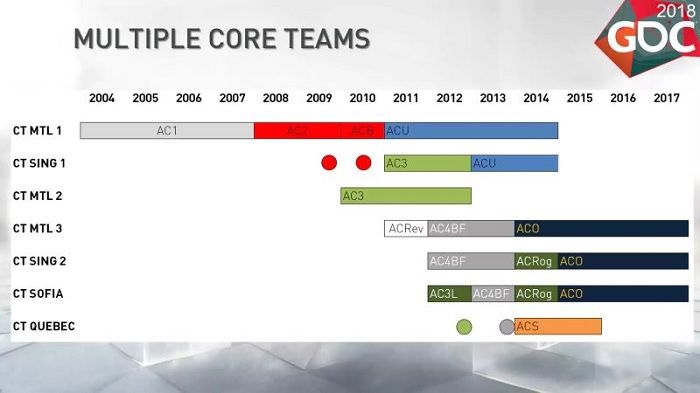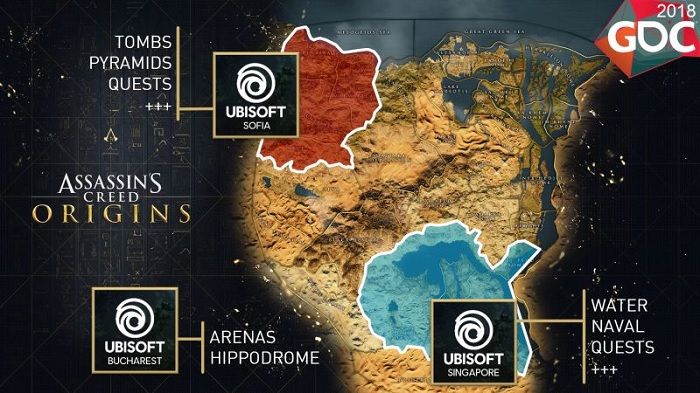Until recently, Ubisoft has had a reputation for producing Assassin's Creed games at a rapid pace, usually at least one per year. That speed seemed to come to a halt with Assassin's Creed Origins, and now Ubisoft has revealed a chart that demonstrates how the company was able to produce Assassin's Creed titles so quickly.
After the release of the original Assassin's Creed in 2007, Ubisoft produced at least one core Assassin's Creed title per year from 2009 all the way until 2015, when the studio openly abandoned its annual release calendar in favor of spending more time on development for each new game. This shift certainly seems to have helped the series, and has been praised as a positive move by the director of Assassin's Creed Origins.
Now, Jean Guesdon, franchise head for Assassin's Creed, unveiled the following chart during a talk at the annual Game Developers Conference, held last month in San Francisco.
Speaking at GDC, Guesdon explained that the rapid pace of Assassin's Creed releases would never have been possible without multiple teams working simultaneously on separate games.
“It only could be done working with multiple core teams,” he said, “I’m not talking about multiple teams collaborating on one game. This was a brand-new thing.”
While mostly academic, the chart he went on to show did reveal some interesting aspects of the series' development history, which had previously been unknown. For instance, the chart reveals that development of Assassin's Creed Unity had actually already begun in 2011, one year before development began on Assassin's Creed 4: Black Flag, even though the latter game would be released a year earlier, in 2013, and boasted a prodigious amount of content despite the shorter development time.
Of course, the chart is no doubt a simplification of the realities of development. It is already known that there was greater collaboration between studios than it depicts, with some Ubisoft studios already known for developing one particular aspect of the series' titles, such as Ubisoft Singapore developing the hidden location missions in the earlier Assassin's Creed games, and the naval combat in the later games. Ubisoft Singapore is the principal studio now developing Skull and Bones, Ubisoft's new pirate IP.
Guesdon went on to reveal an overlay of the Assassin's Creed Origins map which showed which areas had been developed by different studios who collaborated on the game. He explained that Ubisoft has opted to focus more on "co-development," with multiple studios developing a single game at the same time, rather than having different collaborative studios working on several simultaneous games.
“Without Sofia and Singapore," he said, "the world of Assassin’s Creed Origins wouldn’t be the same. They took, big massive chunks of the game including the world, the quests and major systems.”
It remains to be seen whether Ubisoft's new approach to development will see continued success following the release of Assassin's Creed Origins, but the newest title does seem to support the idea that the move was the right direction for Ubisoft to take. Having completed the announced post-launch DLC schedule for Origins, Ubisoft has yet to announce any future projects for Assassin's Creed, although some rumors have already begun to circulate regarding the setting of the series' next game.
Source: Kotaku



